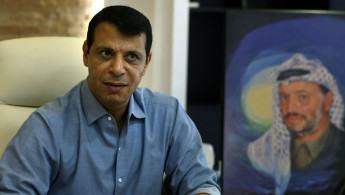Controversy over leaked claims Dahlan to be Gaza PM
The document, entitled "A National Consensus Document for Trust-Building", was obtained by Ma'an News Agency and claims to detail an agreement between Dahlan and Hamas Prime Minister Yahya Sinwar during a week of Egyptian-brokered talks in Cairo this month.
The 15-point document was formulated to address issues of national reconciliation, with the parties agreeing that Dahlan would become head of Gaza's government while Hamas would retain control of the ministry of interior, Ma’an News Agency said.
Sources close to Hamas have claimed that the reports were fabricated, while Dahlan has not issued any public confirmation of the agreement.
Cairo talks
The Cairo meetings were organised as part of a Hamas-Dahlan alliance to challenge the Palestinian Authority, Hamas officials have said.
It comes after the PA issued a litany of punitive measures against Gaza in recent months, including the refusal to pay for electricity to the coastal territory.
Months earlier, the Palestinian Authority cut salaries to workers in Gaza, with the measures widely seen as a way of pressuring Hamas to cede power in Gaza.
Despite traditionally bitter relations between President Abdel Fattah al-Sisi and Hamas, Egypt delivered over a million litres of fuel to Gaza last week.
The delivery was the first manifestation of the June talks in Cairo, and Dahlan is thought to have played a key role in the negotiations.
Changing alliances
Bloody fighting in 2007 left the Palestinian national movement split between Hamas in Gaza, and Fatah in the West Bank.
Dahlan was Fatah's security chief in Gaza at the time of the bitter clashes, but in recent months, and years, has formed an alliance with Hamas to challenge the authority of Palestinian President Mahmoud Abbas.
The exiled Fatah strongman, a fierce rival of Abbas, has a strong base of support among Fatah members in Gaza and has long sought to return to Palestinian politics.
Based in Abu Dhabi, Dahlan is staunchly backed by Egypt and the UAE - not only as a potential Palestinian leader - but also as an anti-Arab Spring figurehead. They also see him as a favourable mediator at a time when both countries seek to reduce Qatar's influence in Gaza.
The Gulf state has traditionally been an important backer of Hamas, something which Saudi Arabia and the UAE have used to justify their blockade against Qatar.





 Follow the Middle East's top stories in English at The New Arab on Google News
Follow the Middle East's top stories in English at The New Arab on Google News


